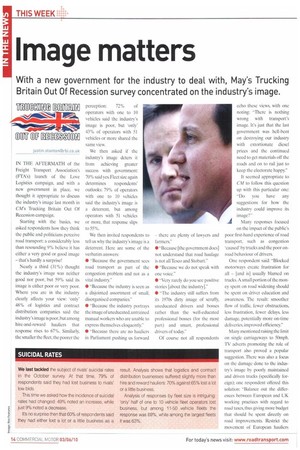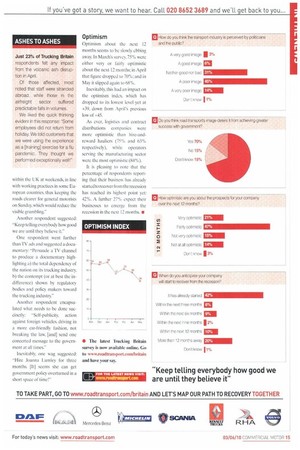Image matters
Page 14

Page 15

If you've noticed an error in this article please click here to report it so we can fix it.
With a new government for the industry to deal, with, May's Trucking Britain Out Of Recession survey concentrated on the industry's image.
IN THE AFTERMATH of the Freight Transport Association's (PTA's) launch of the Love Logistics campaign, and with a new government in place, we thought it appropriate to discuss the industry's image last month in CM's Trucking Britain Out Of Recession campaign.
Starting with the basics, we asked respondents how they think the public and politicians perceive road transport: a considerably less than resounding 9% believe it has either a very good or good image — that's hardly a surprise!
Nearly a third (31%) thought the industry's image was neither good nor poor, but 59% said its image is either poor or very poor. Where you are in the industry clearly affects your view: 'only' 48% of logistics and contract distribution companies said the industry's image is poor, but among hire-and-reward hauliers that response rises to 67%. Similarly, the smaller the fleet, the poorer the perception: 72% of operators with one to 10 vehicles said the industry's image is poor, but 'only' 43% of operators with 51 vehicles or more shared the same view.
We then asked if the industry's image deters it from achieving greater success with government: 70% said yes. Fleet size again determines respondents' outlooks: 79% of operators with one to 10 vehicles said the industry's image is a deterrent, but among operators with 51 vehicles or more, that response slips to 55%.
We then invited respondents to tell us why the industry's image is a deterrent. Here are some of the verbatim answers:
• "Because the government sees road transport as part of the congestion problem and not as a vital industry.
• "Because the industry is seen as a disjointed assortment of small, disorganised companies."
• "Because the industry portrays the image of uneducated,untrained manual workers who are unable to express themselves eloquently."
• "Because there are no hauliers in Parliament pushing us forward
— there are plenty of lawyers and farmers.
• "Because [the government does] not understand that road haulage is not all Tesco and Stobart."
• -Because we do not speak with one voice."
• "Very rarely do you see positive stories [about the industry]."
• "The industry still suffers from its 1970s dirty image of scruffy, uneducated drivers and bosses rather than the well-educated professional bosses (for the most part) and smart, professional drivers of today.
Of course not all respondents echo these views, with one noting: "There is nothing wrong with transport's image. It's just that the last government was hell-bent on destroying our industry with extortionate diesel prices and the continued need to get materials off the roads and on to rail just to keep the electorate happy."
It seemed appropriate to CM to follow this question up with this particular one: "Do you have any suggestions for how the industry could improve its image?"
Many responses focused on the impact of the public's poor first-hand experience of road transport, such as congestion 'caused' by trucks and the poor Oilroad behaviour of drivers, One respondent said: "Blocked motorways create frustration for all — [and is] usually blamed on trucks. A small portion of the money spent on road widening should be spent on driver education and awareness. The result: smoother flow of traffic, fewer obstructions, less frustration, fewer delays, less damage, potentially more on-time deliveries, improved efficiency."
Many mentioned raising the limit on single carriageways to 50mph. TV adverts promoting the role of transport also proved a popular suggestion. There was also a focus on the damage done to the industry's image by poorly maintained and driven trucks (specifically foreign); one respondent offered this solution: "Balance out the differences between European and UK working practices with regard to road taxes, thus giving more budget that should be spent directly on road improvements. Restrict the movement of European hauliers Just 23% of Trucking Britain respondents felt any impact from the volcanic ash disruption in April.
Of those affected, most noted that staff were stranded abroad. while those in the airfreight sector suffered predictable falls in volumes.
We liked the quick thinking evident in this response: "Some employees did not return from holiday. We told customers that we were using the experience as a [training]. exercise for a flu pandemic. They thought we performed exceptionally well!"
within the UK at weekends, in line with working practices in some European countries, thus keeping the roads clearer for general motorists on Sunday, which would reduce the visible grumbling," Another respondent suggested: "Keep telling everybody how good we are until they believe it."
One respondent went further than TV ads and suggested a documentary: "Persuade a TV channel to produce a documentary highlighting a) the total dependency of the nation on its trucking industry, h) the contempt (or at best the indifference) shown by regulatory bodies and policy makers toward the trucking industry"
Another respondent encapsulated what needs to be done succinctly: "Self-publicity, action against foreign vehicles, driving in a more car-friendly fashion, not breaking the law, [and] send one concerted message to the government at all times."
Inevitably, one wag suggested: "Hire Joanna Lumley for three months. [It' seems she can get government policy overturned in a short space of timer
Optimism
Optimism about the next 12 months seems to be slowly ebbing away. In March's survey. 75% were either very or fairly optimistic about the next 12 months: in April that figure dropped to 70%; and in May it slipped again to 68%.
Inevitably, this had an impact on the optimism index, which has dropped to its lowest level yet at +39, down from April's previous low of +45.
As ever, logistics and contract Do you think road transport's image deters it from achieving greater distributions companies were success with government?
more optimistic than hire-and
reward hauliers (75% and 63% Yes 70%
respectively), while operators No 15% , serving the manufacturing sector
were the most optimistic (84%). Don't know 15% It is pleasing to note that the percentage of respondents reporting that their business has already started to recover from the recession has reached its highest point yet: 42%. A further 27% expect their businesses to emerge from the recession in the next 12 months. •
































































































































